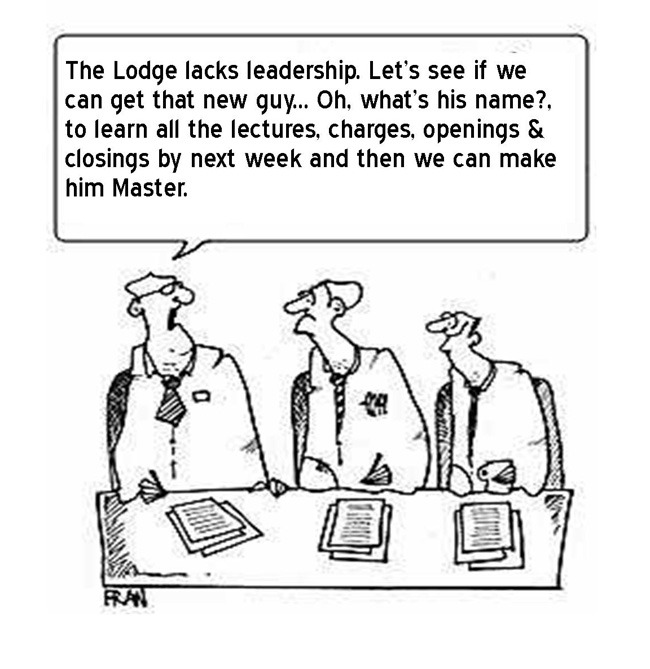
I have spent a considerable amount of time, money and effort over the last 12 years to provide education and direction to leaders of the Masonic Fraternity. There is not a day goes by that I don’t think about some topic about effective leadership and wonder how it might help Masonic leaders.
I have written hundreds of articles, designed and delivered workshops, recorded teaching videos and presented various topics at lodges, shrine temples, and other places that wanted a message about leadership. I say this not to brag, but hopefully, to give you some sense of my credibility from all my experiences and preface what I’m about to say.
So here are some observations from my experiences I believe to be some truths about leadership development for the Masonic Fraternity.
- Everyone wants better leaders but are afraid to do the hard things to get them. What are the hard things you ask?
- Defining the desirable leadership qualities and capabilities they seek and then make them a prerequisite to be elected or appointed an officer.
- After defining what type of leader is wanted, provide training for those who desire to be leaders and make the training mandatory before serving as an officer.
- Spend more time on those who want to improve themselves and their leadership abilities and not on those who are unwilling to learn or believe they already possess the knowledge to lead and are unwilling to learn more.
- Some type of leadership training should be provided for everyone at every level. A true leader recognizes he can never stop learning.
- Everyone wants a quick fix and thinks having people attend a seminar or workshop will fix it.
- Leadership education is a process, not an event. You can’t create effective leaders in several hours or even at a one-day event.
- If you do hold a workshop, it must be structured in such a way that its intent is to change leadership behavior and participants are presented a method they can use to do that. Also, they must understand that the success of the organization is depended on this change, and the behaviors presented are expected if they are to assume an officer position.
- Leadership education should be an integrated system. For example, a grand lodge leadership education program should be the same everywhere in the state.
- There always should be a method for follow-up and accountability.
- A moving officer line doesn’t work if there is no systematic training regimen required.
- Not everyone has the skills to be an effective leader and/or officer.
- Those willing to serve, who could be effective with the right training, aren’t trained. And those willing to serve, who have no potential to be effective leaders, are accepted because no one else wants the job.
- Changing leaders every year has created a mindset of “one-year planning.” The “my year” attitude continues and does nothing to raise the level of continuing effective leadership.
- The “my year” syndrome also prevents us from taking the long view and creating a plan, with a well thought out agreed-upon vision. Without this, each successive leader then has his own personal view of what should be done and why.
- If we find leaders that can lead effectively, they should be allowed to continue to lead. So, if you have a master, grand master or head of any other Masonic body who wants to continue to serve and knows what they’re doing, let’s not stop them.
- Positive change is desired but attempted in the wrong way- it’s haphazard, by command, without a vision or goals, uncommunicated and year-to-year.
- There are too many opinions on what should be done and change efforts are begun without meaningful collaboration.
- We should begin by agreeing on what it is we are trying to accomplish, why are we doing it, who are we trying to benefit and what the fraternity will look like when we get there.
- We then should stop doing things that will not lead us to where we want to be.
- We should develop a model of an effective leadership organization, implement it and be prepared to let leaders who can’t meet our requirements fail.
- We should put all our efforts in to developing leaders who have the desire and abilities to lead.
- We should start acting like what we are: a learning organization, one that values education, one that rewards those who seek to know more about themselves and share knowledge with others.
So there you have it. Some thoughts on my experiences and what I believe needs to happen to change the fraternity’s level of leadership. I know I might anger some, shock some and receive comments like “that can’t be done,” “you’re nuts,” but those who understand effective leadership and learning organizations will get it.
Where do we start? A few lodges, grand lodges, and other Masonic related organizations have. They began a dialogue with their members, they agreed upon what was important to them and why it was. They defined what they were trying to accomplish, what type of men and leaders do they need to accomplish this purpose and answered how they will train these men to lead. Then they acted, failed, learned, reflected, adjusted and acted again. We all should do the same.
Maybe it’s time for one courageous officer, a true leader, to say to his lodge, grand lodge, shrine, Scottish or York rite body, “this coming year we will not do a thing until we agree on who we are, what we do and for whom, and how we will perpetuate our organization to accomplish our vision to improve ourselves, our lives, our communities and Freemasonry.”
I, for one, would help a leader like this. Would you? Let me know your thoughts.


For far to long it’s been a line being moved along to get the position filled and this shows in falling membership. Thinking outside of the box is wonderful if your team is willing to take the risk with you. Otherwise your ideas will fall flat people will see this and go right back to the old ways. The Masonic order needs fine tuning, small steps made in the framework of one goal. We do not need to pull the house down when small repairs over time will bring things back to full value.
Thanks Richard for your thoughts. I agree that effective change comes in gradual steps. Any change must be preceded by a dialogue that creates an action that leads to an agreed upon destination. I like your comment “We do not need to pull the house down when small repairs over time will bring things back to full value.” That’s how change should work.